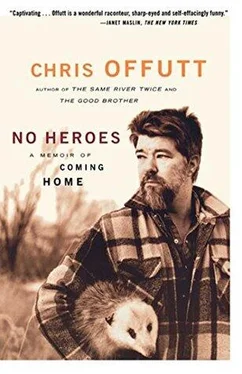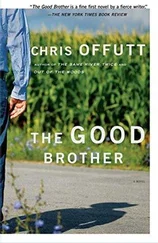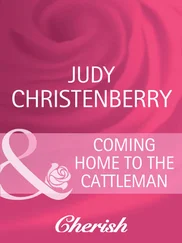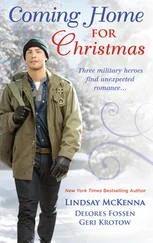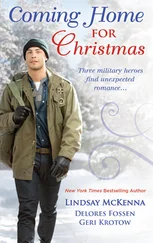He parked and I reminded myself to breathe. Harley was grinning in a new way that was also an old way, draining years from his face, erasing the marks of alcohol, cigarettes, bad food, incarceration. He was not a forty-five-year-old alcoholic on the mend, and I wasn’t his neighbor who left for work and came back home. We were two Haldeman boys on the loose. Anything might happen. If we spent the night in the pokey, we’d laugh in the morning. If we wrecked the car, we’d cover it up with bushes and walk home through the woods. I was proud of Harley, and happy for him, but if you’re a man in eastern Kentucky, you can’t go around saying you love other men. We communicated through our cars, our fists, and the ancient go-between of women.
I hit him in the shoulder.
“You’re a good driver,” I said. “I bet you could go anywhere you wanted to. Farther than West Virginia even.”
“You reckon?”
“I know it.”
I opened the door and placed a boot on the cement.
“Chris,” he said.
I turned my head three-quarters. His grin had faded and the years returned, but he was still Harley. He looked hard at me. I didn’t know what was coming. It might be anything — an offer to smoke a joint or drink some whiskey, a request for a loan, a punch in the face.
“Haldeman was nice, wasn’t it,” he said.
“Yes,” I said.
“I got to where I had to leave there.”
“I know, Harley. Me, too.”
“Sometimes I miss it.”
I left the car and hurried away and hid behind a tree. I leaned around it like I had a hundred times with Harley as a boy in the woods. He lifted his chin in a wave. His hands were on the wheel, a cigarette in his mouth. He shifted the car into gear. He slowly backed the car into the street, stopping every five feet to check both ways.
I understood why people were afraid of him heading to Huntington on his own. I also understood how the liberty of departure gave him confidence. In Morehead, Harley drove the way everyone expected him to drive, but I suspected he had driven differently on his way to West Virginia. Like me, he had to leave to defy expectations. If Sandra left the hills, I felt sure she’d look up words she didn’t know.
Arthur Volunteers for a Concentration Camp
I have a chance to go to the camp where my wife is. I volunteer to go but the day before I arrive, they evacuated my wife. I am the only person in the war who volunteered for concentration camp.
Plaszow is where my worst is. Whatever bad happened to me physically happened there. And it was bad for many reasons. It was the same city I was born in. People who used to be my friends treat me not so good. There was a gallows, a whipping place, and a shooting place. Each a different type of punishment. I didn’t know for what you got beaten, for what you got hung, for what you got shot. I wasn’t interested. They shaved us. A very short crew cut. But to give us a little oomph, they shaved a stripe down the middle of the crew cut. You could recognize a prisoner right away.
Shooting people was a daily occurrence. I was working on an electric pole one day and it was a desolated part of the camp, on the outskirts. A beautiful day. The countryside is lush. I was working and I saw this car, a Mercedes, stop and a very elegant lady came out of it with a German officer. They walked with a little girl. It was often the case, some of the very pretty women, Jewish women, wound up with the German officers. She had a nice fur coat. I didn’t see her face. She took a walk with him and he shot the girl and then he shot her. He drove the car away. I continue working on the electric pole.
They put me in with a group of electricians from Kraków and they don’t like me. They sent me into the worst places, for instance, to fix things for the commander of the camp. He is Goeth, a complete lunatic. He rides a white horse with his lover to the camp at sunrise. A beautiful woman with long hair. He had these stallions, riding around the camp. He is from Vienna. Very tall, a beautiful man. Looks like something out of an Aryan opera. Something not quite earthly. He has two dogs running with him all the time, killers these dogs.
Goeth loved to shoot people for any kind of reason. He would go to the women’s camp where they peeled potatoes and he would say, ladies, please do your work, and he’d go around this mound of potatoes, and say, this is a beautiful child, this is a beautiful child. She doesn’t deserve this. She deserves better. So he shot her. After the war, Goeth’s defense is he had to be cruel to stay in command because if Berlin knew he was soft on the Jews, they would replace him. To save Jews, he had to be harsh.
He has a magnificent little villa on top of the camp, and a lot of Hungarian girls working for him. There’s a whole operation going on. He has a beautiful garden with elegant lights and a piano. Best wines, best liquor, classical music all the time. I love it when the electricians send me to the villa because the girls give me food. The electricians are sending me there because Goeth is crazy and might shoot me, but I’m getting food. I want to go there. They think I’m the crazy one, not Goeth!
The electric iron doesn’t work and I can’t fix it. Time is done with it. The light is coming from the ceiling and a shadow is in my eyes. I turn around, and Goeth was standing over me. He said, does it work?
The only thing I can do is make believe. I push this wire in, put the screws in the thing. Nothing explodes. Suddenly it works for a minute. I am saved.
I had the pleasure to look into his eyes and if I ever saw the Devil looking at me, it was him because his eyes were as cold as steel. I had this heavy iron. I could have certainly hurt him badly. I could have hit him at least twice. He was hanged after the war, but I could have killed him. Death was liberating for him. You cannot hurt or demean somebody who’s dead. Him and Hitler should have been sentenced to life in prison under the same conditions as me.
It was terrible, because you never knew from day to day what was the next for us. Everybody was for themselves. I got used to it, everybody gets used to it when you have to. It was not so terrible anymore. The food was not so bad but a lot of people froze to death.
I didn’t let myself go like some people. They got overridden by lice and by pimples. They didn’t look like humans. I exchanged one week of bread for a little comb and a mirror. That was my black market. I had it all the time. Nobody else used it. The lice was very bad but I didn’t have lice. I cut my hair myself for style a little. And my uniform I make nicer. Always I try to look a little good. I am still very vain.
I tried to help people in little ways. I made dresses from burlap sacks so they look healthy. It was important to look healthy. If not, to the clinic and you die. In camp you want them to think you are healthy. I exchange my potatoes for beets, and I use the beets to rub on my face for color. I look a little better. This I do for the others who aren’t so good. Who are maybe a little sick. Beets. It makes good color of the cheek.
After the war I met a woman on the Pitkin Avenue in Brooklyn. She is hugging and crying and saying I am an angel. She tells this to Rita. I am not an angel. I did terrible things. I was lucky.
Sometimes I worry if I can pull this off. I leave my writing desk in tears. Will people care that a gentile is writing about the Holocaust? Am I appropriating Jewish material? Am I respectful enough? Why am I doing it in the first place? The questions continue endlessly, the writer’s self-torture at three A.M. There were no Jews where I grew up. As a kid I thought they were the same as Christians only they went to church on Saturday. I married the first Jew I met.
Читать дальше
